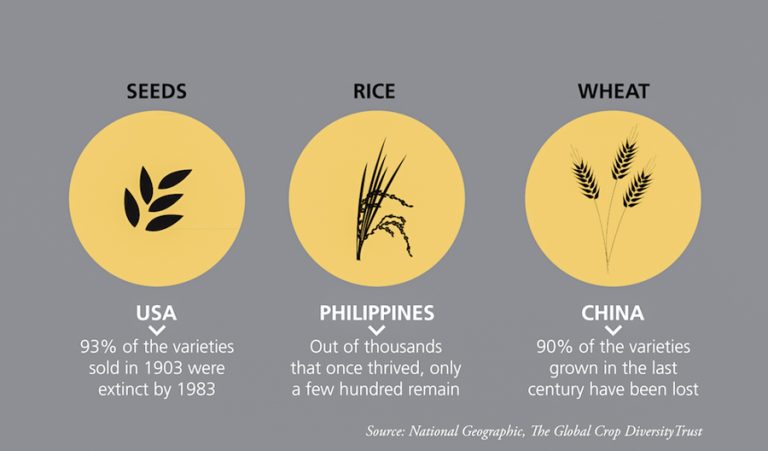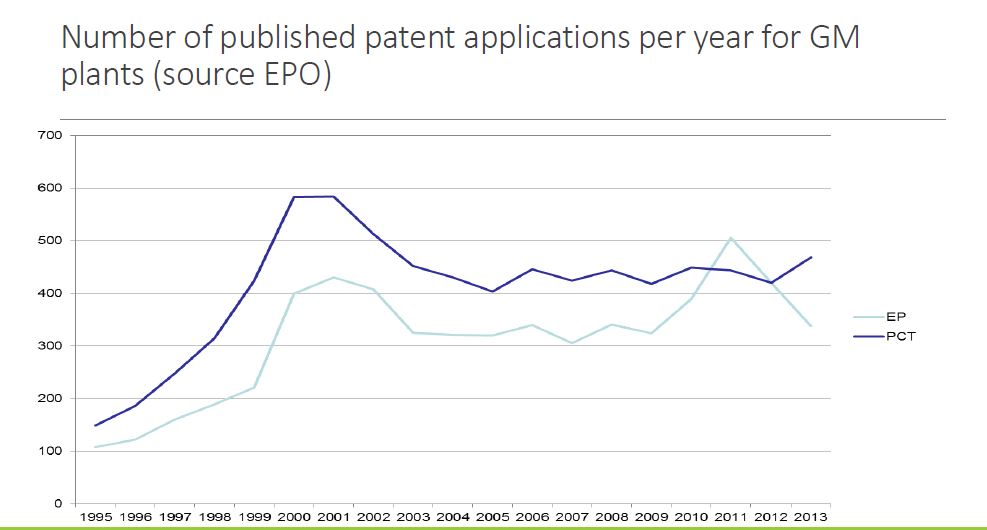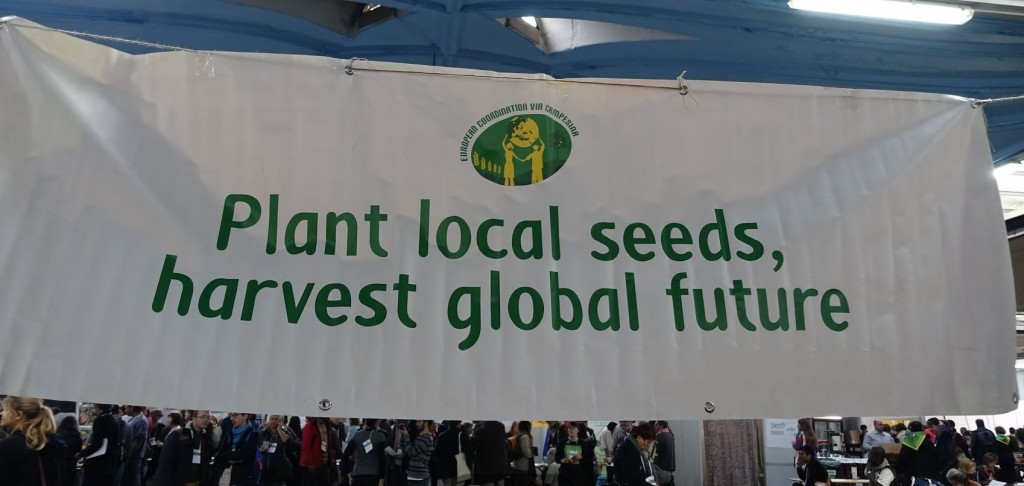(this page is a collection of articles / links / projects submitted by students regarding this topic. Boerengroep intends to collect different sources and view points around a certain topic in order to stimulate a critical view on the food production chain).
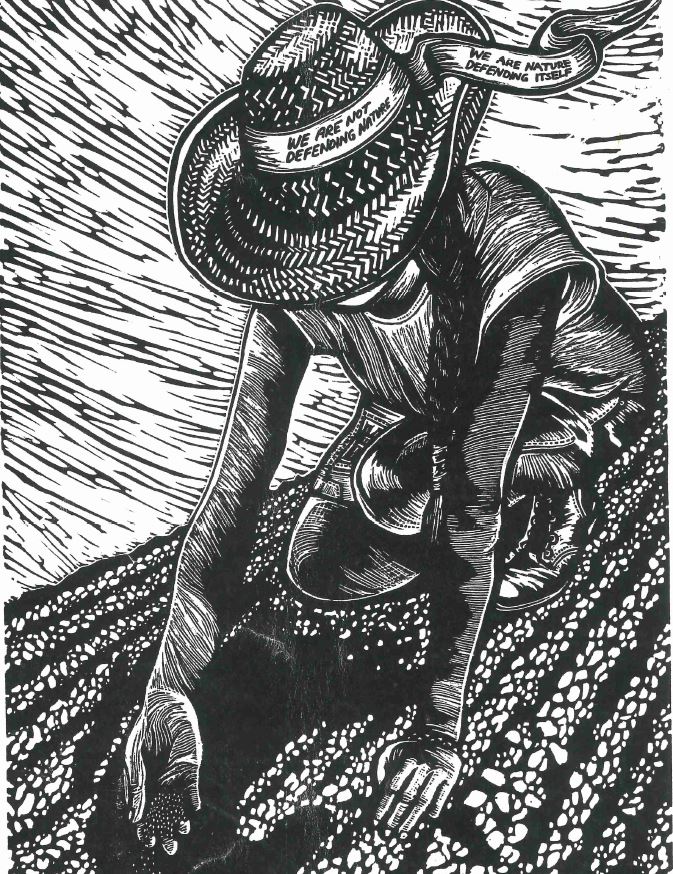 Seed is the first link in the food chain
Seed is the first link in the food chain
embodying millennia of evolution,
thousands of years of farmers breeding
as well as the culture of freely saving and sharing seed.
Intellectual Property Right (IPR) Intellectual Property refers to creations of the intellect for which a monopoly is assigned to designated owners by law. IPR is believed to be needed for return of investment and to have the freedom to operate. IP related to plants is divided as following:
- Breeders Right: IP for a plant variety. Exclusive right to sell, produce and use the variety, but other breeders are allowed to use the variety in their breeding program.
- Patent Right: IP for a genetic plant trait (DNA). (all varieties with that trait). No one is allowed to continue breeding plants containing this trait. No one is allowed to grow plants, harvesting seeds/ fruits containing this trait that have not been bought from the patent-holder.
Stichting Boerengroep is concerned about the influence of patents on life regarding food sovereignty, for the following reasons:
THREAT TO BREEDERS. Note the case of the Bolster (organic seed company) which had bred a broccoli variety with a long stem (easier to harvest). This was then patented by Monsanto and the Bolster couldn’t grow their own variety anymore.
THREAT TO PEASANT AGRICULTURE. Genetic engineered products can become a threat to peasant agriculture. Here’s the example of Cargill’s ‘EverSweet’ that could be a major threat to small scale farmers in the global south. Read here.
MONOPOLY. The world’s top three corporations control over half (53%) of the world’s commercial seed market; the top 10 control over three-quarters (76%). Big, powerful industry is gaining more and more monopoly by buying other seed and breeding companies, as well as making it difficult for small breeders, peasants and indigenous peoples to continue using their own varieties. This causes a rapid decline of genetic resources (‘genetic erosion’). Note that companies like Monsanto are breeding for specific traits, favored by the free market industry, and not per se nutritional value or safe guarding biodiversity. Moreover, by increasing profit, big corporations can spend more and more money on lobbying – but until what extend can we allow the influence on decision-making and research and education? (e.g. see a report of Corporate Europe here)
GENETIC EROSION. The loss of local species and varieties leads to the irreversible loss of the genetic diversity they contain, including the genes for adaptation to the conditions in which they evolved. This genetic erosion has dangerously shrunk the genetic pool available for the natural selection, and selection by farmers and plant breeders, with a consequent increase in the vulnerability of agricultural crops to sudden climatic changes, as well as the appearance of new pests and diseases.
In short, when seeds are in the hands of the peasants, their varieties will adapt to the local conditions. However, when seeds are in the hands of just a few companies, breeding for traits favored by the free market (uniformity, easy to harvest, high yield above nutritional value and local adaptation), the plant varieties will become uniform. We can see what happens when there is a change in the climate, or an occurring pest: with seeds in the hands of the peasants, there is a lot of biodiversity and some varieties will survive. With seeds in the hands of a few multinationals, there is just a little biodiversity and those few varieties might all be non resilient against the pest or climate change..
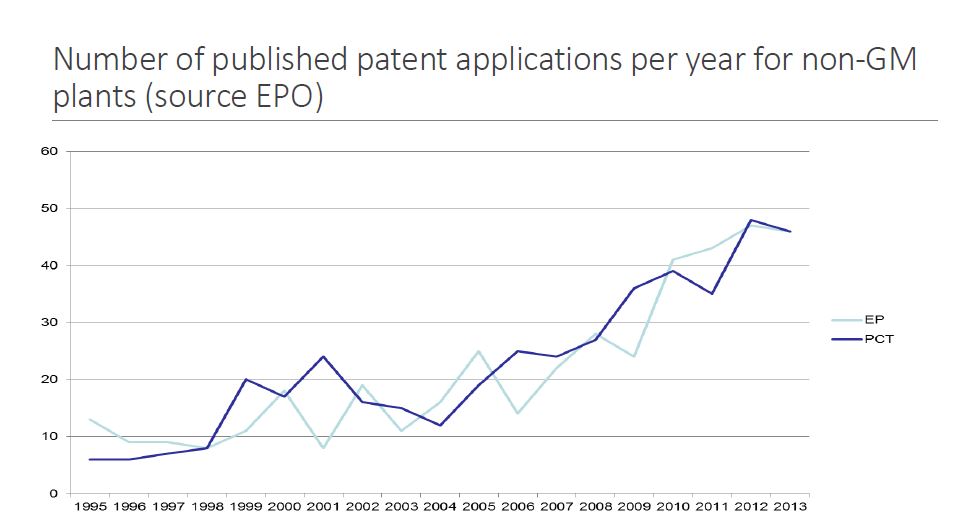
Find out more:
- Short presentation “Introduction to Patents, Plant Breeders’ Rights and the Biotech Directive” Prof. Dr. Axel Metzger, 2016. View here
- Report of visit & discussion with Monsanto Wageningen, June 2016. Download here..
- Seed Freedom and EU regulations by Vandana Shiva, Ivan Mammana (ASEED) en Elly Janssen (ASEED). VoedselAnders, 2014. Read here..
- Peasant Seeds. Rights and Power. Nyeleni, 2011. Download here..
- Down on the Seed: the Worldbank enables corporate take-over of seeds. Oakland Institute, 2017. Download pdf here.
Only six multinationals currently control over two-thirds of the industrial seed sales, and pending agro-industry mergers stand to further consolidate this oligopoly. Further market expansion for these corporations depends on the shrinking of farmer-managed seed systems, which currently provide 80 to 90 percent of the seed supply in developing countries through on-farm seed saving and farmer-to-farmer seed exchange. This document exposes that while the World Bank claims to promote “smart and balanced policies,” its Enabling the Business of Agriculture index blatantly ignores farmer-managed seed systems. Instead, it reinforces the stranglehold of agrochemical companies and Western nations by pushing for intellectual property rights in agriculture, so that private breeders profiteer from the use of their seeds by farmers - Biotech Lobby’s push for new GMOs to escape regulation. Corporate Europe, 2016. Download here
- New techniques of genetic engineering, March 2016. Download here
- Seeds and WAR: A Letter of solidarity to the peasants in Syria. Read here
“The Iraq war was one of the clearest examples of how the situation of war is being used by the powers to gain control over local markets and over whole populations: first they bombed the seed bank in Abu Ghraib and thus forever buried the most extensive samples of human kind’s seed history. They have destroyed this treasure for their own benefit: the new set of laws implemented on Iraq by the US administration now forbids the growing of traditional Iraqi seeds and pushes for the seeds of some of the few seed companies in power worldwide to grab hold of Iraq’s seed market. It should be mentioned that Monsanto, one of the biggest of these companies had the violent private military group ‘Blackwater’ working for them. Seeds are systematically stolen in wars.” - Report on the ’15th Garden’ Syria: “They tried to bury us, but they didn’t know we were seeds”. 2017. Read online
- Sowing Seeds of Freedom. Boerengroep, maart 2017 Read online
- Access and Benefit Sharing of genetic resources.
– Strengthening Farmer-led Seed Systems. WUR, 2016. Panel discussion with Edith Lammerts van Bueren (WUR, Louis Bolk), Ronnie Vernooy (Biodiversity International), Rene Groenen (gardener bio-dynamic garden De Groenen Hof). Panel discussion here: Video
– Vanaja Ramprasad (GREEN Foundation, India) talks about the lessons learnt from community seed banks, especially in relation to access and benefit sharing for family farmers. Her video message here..
– Farming Matters, 2016. Access and benefit sharing of genetic resources – Making it work for family farmers. Read the booklet here.. - Finding the Balance. Conference here; Video here
- Putting the Cartel before the Horse…and farm, Seeds, Soil, Peasants, etc. – Who will Control Agricultural Inputs, 2013? ETC Group, 2013. Download pdf here..
- Doubts about the Bounty of GMO crops. NY Times here
- A little reflection and explanation by ASEED. Read here
- Concentration of Market Power in the EU Seed Market. The Greens. EFA. Download pdf here..
- The Monsanto-Bayer-tie-up is just one of seven. ETC Group here
- The Law of the SEED. Download pdf here..
- Tamara Wattnem (2016): Seed laws, certification and standardization: outlawing informal seed systems in the Global South, The Journal of Peasant Studies. Download pdf
- Kloppenborg, 2014. Re-purposing the masters tools. the open source seed initiative and the struggle for seed sovereignty. Download pdf
- Seeds: ins and outs. Organic Seed production & current seed issues. Presentation by Loes Mertens (Bolster, Msc Organic Agriculture), FEI, 2015, WUR. Presentation here…
- Seeds of Transition. Zeeuwse Vlegel: a Promising Niche for Sustainable Wheat Production. Wiskerke and Oerlemans. Download here..
Movies and documentaries on seeds:
- Seeds of Freedom / Seeds of Sovereignty / Seeds of Justice – seedsoffreedom.info
The story of seed has become one of loss, control, dependence and debt. It’s been written by those who want to make vast profit from our food system, no matter what the true cost. It’s time to change the story. Seeds of Freedom charts the story of seed from its roots at the heart of traditional, diversity rich farming systems across the world, to being transformed into a powerful commodity, used to monopolise the global food system.The film highlights the extent to which the industrial agricultural system, and genetically modified (GM) seeds in particular, has impacted on the enormous agro -biodiversity evolved by farmers and communities around the world, since the beginning of agriculture. -
Seed Matters – Seed Matters
Seed Matters is a short film which explores the importance of seed – for the environment, health, food and sustainability, the issues facing it and ways to overcome these problems. The film gathers some of the key people who attended the Great Seed Festival in 2014, including Mama Udongo of Community Centred Knowledge, Liz Hosken of the Gaia Foundation and Patrick Mulvany of the UK Food Group. They each share their thoughts on food, diversity, genetic modification and other matters around seed. - Whoever Controls Seeds, Controls the Food System – short movie
The small-scale farmers’ right to store and share seeds, in countries like Ghana, is under threat by the New Alliance for Food Security and Nutrition – an aid programme supported by the UK and other G7 nations. Food sovereignty is under threat, with multi-national corporations poised to gain control over the rights to seeds, forcing many small farmers out of business
- Our Seeds – short movie
A documentary on traditional diets and how they are grown and eaten in eleven countries: Spain, France, Italy, India, Sri Lanka, China, Vietnam, Taiwan, Papua New Guinea and Solomon Islands. “Our Seeds” addresses the problems of globalised food based on hybrids that require pesticides and synthetic fertilisers.
- Fighting for Seeds and Soil – short movie
The UK government, the EU and other rich nations have been channelling billions of pounds towards a model that pushes these chemical techniques on farmers. See the powerful story they have been sold by the world’s biggest food and agricultural corporations. We went to Tanzania to hear about another story. It is a story without the multi billion pound investments. But instead it has people power. Millions of small-scale farmers across the world are building an ecological model of farming that increases yields but doesn’t require chemicals, making it better for the environment and importantly gives control over food growing to the farmer rather than a corporation.
- Farmer to Farmer – short documentary
- Seed Hunter – documentary
- Seed Act – short movie
Seed Act is a short film about how different people and organisations get hands on for seed sovereignty, to protect life, biodiversity and the production of healthy seeds, in a world which is increasingly regulated and suffocated by seed acts, legislations limiting what has always been humanity’s birthright: to sow, cultivate, harvest, consume and exchange natural seeds.
- From Seed to Seed
From Seed to Seed is a pedagogical film intended for all those who wish to learn how to produce their own vegetable seeds. With the help of magnificent images and short animated drawings it shows, step by step, the production of seeds of 32 kinds of vegetables. In addition, eight theoretical or practical ‘ABCs’ explain the general bases of seed production. You will understand the cycle of each vegetable from seed to seed, the biology of their flowers and the phenomenon of pollination. You will be able to follow in detail the gestures and techniques used for harvesting, extracting, sorting and storing seeds.
4 DVDs in English, French and German versions, 436 minutes. On the website http://www.seedfilme.org/ you can find more information about the content and how to get a copy. In the Netherlands you can order the film at Omslag. The film is made by people from Longo maï, a European network of agricultural cooperatives.
Where can I find seeds and seedlings?
- You can order seeds from the seed bank CGN Wageningen: website
- Seed Fairs, like Reclaim the Seeds in the Netherlands, every year: reclaimtheseeds.nl
- Visit local farmers and ask them where they get their seeds from, if they save seeds themselves. (e.g. find self-saved bean varieties at Ommuurde Tuin, close to Wageningen)
- Join foundations like Stichting de Oerakker
- Companies like:
- de Bolster
- Vreeken’s Zaden
- OnsZaden
- De Beersche Hoeve
- Biologischzaad.nl (www.biologischzaad.nl)
- Bouma (www.biologischpootgoed.nl)
- 123Zaden (www.123zaden.nl)
- De Godin (www.degodin.nl)
- De Nieuwe Tuin (www.denieuwetuin.be)
- Biosano bvba (www.mijnbiotuin.be)
- De Loods (www.deloodsvzw.be)
- Ecoflora (www.ecoflora.be)
- Zahra Seeds (www.zahraseeds.eu)
- Educational Films on seed production: here


